NEWS & UPDATES

Thank You Volunteers!
The dedication, compassion, and hard work of Preble Street volunteers make a profound impact on the lives of those we serve. This year, we’ve been fortunate to have over 1,150 individual volunteers contributing an astonishing 17,800 volunteer hours. The commitment of the many individuals who come out in all sorts of weather to create positive
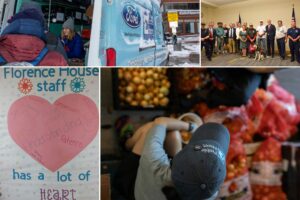
A look back at 2023
2023, like most years, was full of many challenges. But, after nearly 50 years of anti-poverty work, we know how important it is to focus on the many positive things that happened this year. Preble Street continued to produce and distribute thousands of daily meals at our Food Security Hub to meet increasing food needs,

Preble Street Board Profile – Chip Leighton: Curbside Winter 2023/24
How did you first get involved with Preble Street? About 15 years ago, I started volunteering at the (then) Soup Kitchen with a group from my church, St. Alban’s Episcopal Church in Cape Elizabeth. I spent the first five years or so on the cleanup crew before I finally graduated to kitchen duties! What do
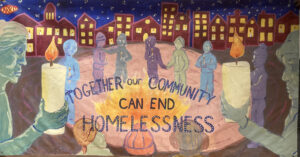
What will it take to end Maine’s homelessness crisis? Curbside: Winter 2023/24
Many communities across the United States are struggling with how to respond to the growing number of people who are experiencing unsheltered homelessness. Thanks to the pandemic, along with the lack of affordable and available housing and shelter, Maine is one of those places. All of us agree that people living in tents and encampments
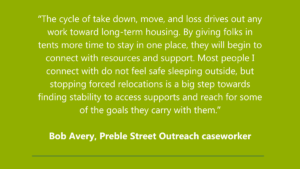
Postpone the sweep of the Harbor View Park encampment until after the new year
People needing to live outside on streets or encampments in the cold of winter is inhumane and dangerous. But, sweeps are inhumane and dangerous too. We are outraged by the City of Portland’s announcement that they will sweep Harbor View Park on Tuesday, December 19, 2023. Please reach out to the Mayor, the City Manager,

What can you do in one year? A look at Preble Street impacts in 2023: Curbside Winter 2023/24
Three Preble Street programs celebrated their first year of operation in 2023! Elena’s Way, a Preble Street Wellness Shelter Elena’s Way serves the needs of individuals experiencing unsheltered homelessness, individuals unable to access other shelter services, and individuals who are extremely vulnerable should they be unsheltered. At Elena’s Way, guests have control of their own
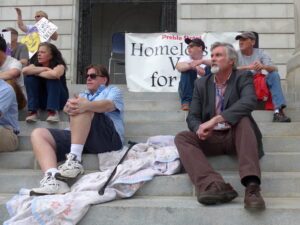
Letter from Swannie: Curbside Winter 2023/24
Photo: Mark Swann, on right, at a 2015 protest in front of Portland’s City Hall advocating for more overflow shelter capacity. Ensuring that there are enough shelter beds for all who need them continues to impact vulnerable Mainers. Right now, we are at a tipping point for homelessness in Maine. The number of people experiencing

Low-Barrier Shelter Funding Testimony by Mark Swann to Joint Select Committee on Housing
Delivered December 5, 2023 Good morning, Senator Pierce, Representative Gere, and members of the Joint Committee on Housing, thank you so much for inviting me to speak to you today. My name is Mark Swann, and I am the Executive Director at Preble Street, a nonprofit human service agency with over fifteen programs serving the

The importance of funding for low-barrier shelters
Hundreds of Mainers are living outside in the elements in our parks, alongside our highways, and on our streets. With shelters across the state at capacity every night, each tent you see is a visual representation of the critical need for shelter beds in communities all across our state. It is inhumane for people to

No Homeless Veterans Challenge to continue
Veteran homelessness is a big, but solvable problem, in Maine. And Mainers are united in the belief that no Veteran should have to endure the struggle of homelessness. In August 2023 when the No Homeless Veterans Challenge launched, there were over 200 Maine Veterans in homeless shelters, sleeping outside, or living in their cars and

November is Youth Homelessness Month
“I would not be where I am today if it wasn’t for the Teen Center.” Tricia After the last Point in Time count in January 2022, there were 3455 people experiencing homelessness in Maine and approximately 30% of that population was under the age of 24. Homeless youth experience higher levels of human trafficking, interpersonal
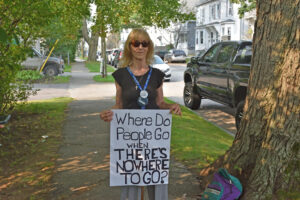
Contact Portland City Councilors to ask them to stop the sweeps and continue to work on solutions that will move people to shelter and housing
On Monday, November 20, 2023, at 5 pm, the Portland City Council will consider an ordinance amendment drafted by City Councilors Anna Trevorrow and Roberto Rodriguez that will effectively place a moratorium on encampment sweeps and lift the “emphasis” area designations through April 30, 2024. Please reach out to Portland City Councilors to ask them